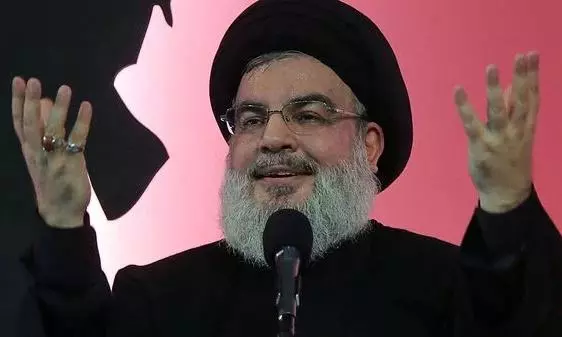
Israel claims killing of Hassan Nasrallah, Hezbollah yet to respond
text_fieldsThe Israeli claim of killing Sayyed Hassan Nasrallah, the prominent leader of Hezbollah and a revered figure for Shia Muslims, in a massive strike on an underground headquarters in Beirut’s southern suburbs of Dahiyeh, could be a devastating escalation in Israel’s ongoing war with Palestine and Lebanon.
Though there has been no official response from Hezbollah, the Israeli Defense Forces (IDF) stated that Nasrallah, 64, was killed during a precision strike on Hezbollah’s underground headquarters. Nasrallah had been a key figure in Lebanon's political and military landscape for over three decades, serving as both a spiritual and political leader.
The airstrike also reportedly killed several senior Hezbollah commanders, including Ali Karki, the commander of Hezbollah’s southern front, during a meeting held at the group's command complex. The Lebanese Health Ministry reported that six civilians were killed, and 91 others injured, as several apartment buildings were destroyed in the bombing.
Israel’s military has intensified its operations in Lebanon, focusing on Hezbollah strongholds in Beirut's southern suburbs. The Israeli airstrikes were reportedly conducted using F15I jets equipped with bunker-busting bombs, targeting the command complex embedded beneath residential buildings.
The IDF has attributed the success of the operation to precise intelligence and extensive planning, which had allowed Israeli forces to strike while Hezbollah's leadership was present. Israel's chief of staff has indicated that further strikes could follow, suggesting that the military's efforts to weaken Hezbollah are far from over.
Despite Israel’s claims, Hezbollah has yet to issue a formal statement on Nasrallah's death. The news has shocked residents of Lebanon, particularly those living in Dahiyeh, the heart of Hezbollah’s support base. While some residents are in disbelief, others have expressed resilience, stating that Hezbollah's influence extends beyond any one leader. Nasrallah was a deeply revered figure among Hezbollah’s supporters, often regarded as a symbol of resistance against Israeli occupation.
Iran has condemned the Israeli strikes, calling them a dangerous escalation and warning of potential retaliation. While Iran has so far remained cautious in its involvement, Nasrallah's death could trigger a broader regional conflict, with Iran possibly stepping up its support for Hezbollah.
Israel, meanwhile, has placed its military on high alert, anticipating the possibility of further escalation. In response to the strikes, the Israeli military has mobilised additional reserve troops and sent brigades to northern Israel, preparing for a potential ground invasion. The strikes come amid growing concerns that the conflict could expand, involving more regional powers and drawing in international actors seeking to mediate a truce.






















